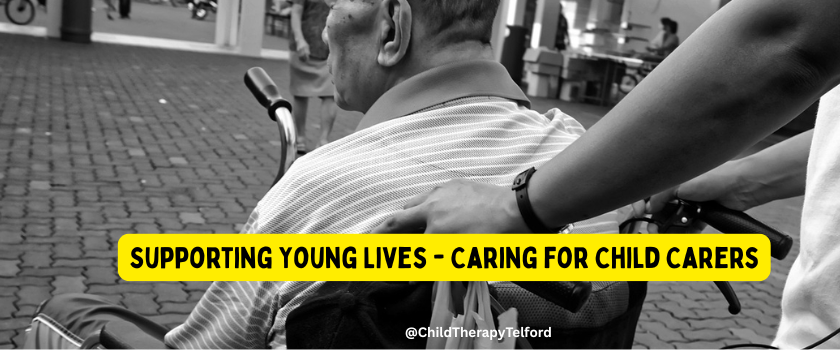Supporting Young Lives – Caring for Child Carers

The 2021 Census said there were approximately 120,000 young carers, aged between 5 and 17 years, in England and 8,200 in Wales.
This trend underscores a serious issue affecting the mental health and educational outcomes of children, particularly in communities like Telford.
The Impact of Caring on Children
Being a child carer often comes with immense responsibilities that can lead to heightened anxiety levels. These children frequently face challenges that their peers do not, such as balancing schoolwork with caregiving tasks. They may be responsible for looking after a parent or sibling, which can lead to significant emotional and physical strain.
Research suggests that child carers are more likely to develop special educational needs, largely due to the educational opportunities they miss. These children often take more time off school and struggle to keep up with their studies. The pressure of caring can lead to increased anxiety, affecting their ability to focus and learn effectively.
In Telford, many child carers come from families with lower financial incomes, which can exacerbate their situations. The stress of caregiving, combined with financial difficulties, can lead to health issues such as fatigue and anxiety. Children caring for younger siblings may find themselves cooking, cleaning, and facilitating daily activities, which further detracts from their own educational needs.
Recognising the Signs
It is crucial for teachers and caregivers to recognise the signs that may indicate a child is taking on a caregiving role. Indicators to look out for include:
• Frequent Absences: If a child is taking more sick days than usual, it may suggest they are overwhelmed by their responsibilities at home.
• Tiredness: Children who appear unusually tired or who oversleep and arrive late to school may be struggling to balance their caregiving duties.
• Academic Difficulties: Missing homework deadlines or a decline in academic performance can also signal that a child is preoccupied with their caregiving responsibilities.
Understanding these signs can help educators provide the necessary support to child carers, enabling them to thrive both academically and emotionally.
Seeking Help
For teachers observing these signs, the first step is to discuss concerns with other staff members who interact with the child. Sharing insights can provide a clearer picture of the child’s situation and help formulate a plan for support. Reaching out to the child’s family can be sensitive but crucial. It is important to approach the family with empathy, highlighting the impact that caregiving responsibilities may have on the child’s academic performance and future prospects.
Encouraging families to seek external support can be a slow process. They may need to undergo assessments by social workers or health professionals to access additional help or funding. Patience and persistence are essential in navigating these systems.
Moving Forward
If a family is successful in obtaining support, it is vital to involve the child in the transition process. Children often feel a profound sense of duty towards the relatives they care for, and it’s important to reassure them that their loved ones will be safe and well-cared for. Emphasising that focusing on their education does not equate to being unreasonable or selfish is crucial.
Supportive open communication about their feelings can help alleviate some of the anxiety they may experience. Providing a safe space for children to express their concerns and fears fosters resilience and helps them adapt to their new circumstances.
The growing number of child carers presents a unique challenge that requires attention and support from the community. By recognising the signs of caregiving responsibilities and understanding the associated anxieties, we can work together to provide these children with the help they need.
Supporting child carers not only benefits their immediate well-being but also helps pave the way for a brighter future, allowing them to achieve their full potential in both education and life.
For more information and resources on supporting child carers, please visit https://carers.org/about-caring/about-young-carers https://www.actionforchildren.org.uk
https://childtherapytelford.nlp4kids.org
 07966 819194
07966 819194
 louisa@nlp4kids.org
louisa@nlp4kids.org
 07966 819194
07966 819194
 louisa@nlp4kids.org
louisa@nlp4kids.org
The original version of this article was written by Gemma Bailey, director of www.NLP4Kids.org. It was republished and rebuilt with additional content by Louisa Gauld-Crichton – Child Therapy Telford. https://childtherapytelford.nlp4kids.org
Leave a comment
This site uses Akismet to reduce spam. Learn how your comment data is processed.




Leave a Reply